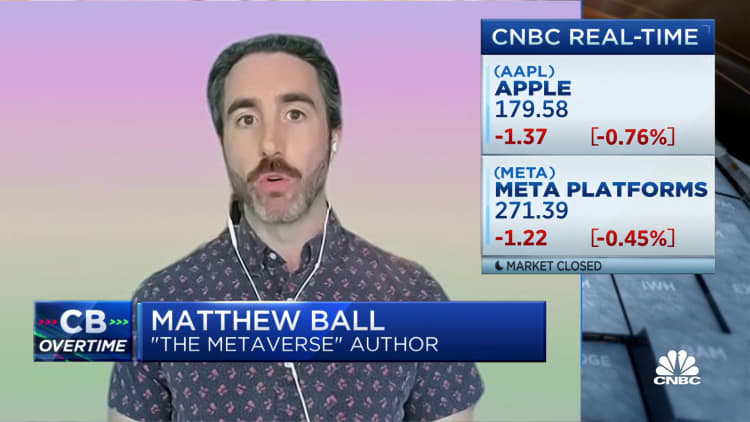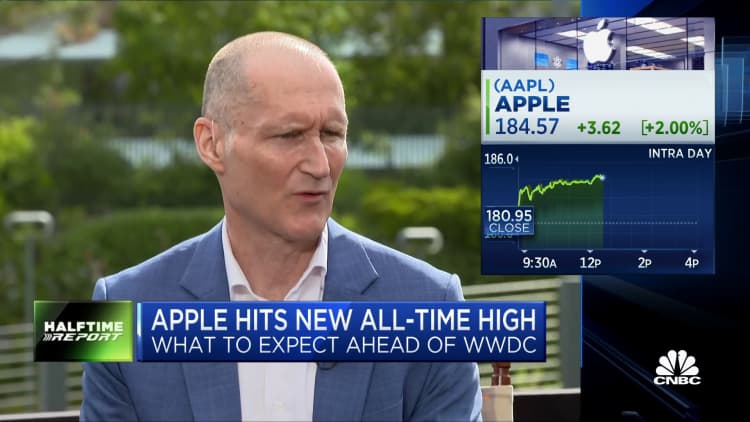Mark Zuckerberg, chief executive officer of Meta Platforms Inc., demonstrates the Meta Quest Pro during the virtual Meta Connect event in New York, US, on Tuesday, Oct. 11, 2022.
Michael Nagle | Bloomberg | Getty Images
Meta founder Mark Zuckerberg and Apple CEO Tim Cook have spent the last several years sparring over internet privacy and digital advertising. But they’ve never competed head-to-head in a real way.
That’s about to change.
With Apple officially announcing its long-awaited mixed-reality headset — the Vision Pro — on Monday, the iPhone maker and Facebook’s parent are now firmly in the same market.
Zuckerberg and Cook both see the next major era of personal computing as one that involves people putting on a headset to enter a virtual world and interacting with digital objects in 3D. Cook describes it as spatial computing, and Zuckerberg calls it the metaverse. Other technologists refer to it as mixed or augmented reality, because digital imagery can be superimposed onto the physical world.
Facebook jumped into the market nine years ago, when it acquired VR headset startup Oculus for $2 billion. In late 2021, the company changed its name to Meta, and Zuckerberg committed to spending billions of dollars a quarter developing the underlying VR and AR technologies needed to make his vision of the future a reality.
As of today, Meta owns the lion’s share of a nascent market, far outpacing rivals like Sony, HTC and Magic Leap in headset sales. Research firm CCS Insight recently reported that global shipments of VR and AR headsets plummeted over 12% to 9.6 million in 2022 from the prior year, as consumers pulled back on discretionary spending.
Several technology analysts told CNBC in December that Apple’s entry into the VR and AR market could give the sector the jolt it needs to start getting consumers more excited.

As CCS Insight analyst Leo Gebbie said, “If one company has the ability to transform the VR market overnight, it’s Apple.”
But Apple hasn’t said exactly when Vision Pro will be available, only that it will be early next year. More importantly, it’s hardly designed to be a mass-market product, at least at the beginning. The initial prices is $3,499.
That gives Zuckerberg some breathing room. Meta’s Quest family of VR headsets include the $300 Quest 2 and the $500 Quest 3, which will be available in the fall. The company’s Reality Labs division, which is responsible for hardware and software development, lost $13.72 billion last year and another $3.99 billion in the first quarter.
Wall Street hammered Meta in 2022, sending the stock down by almost two-thirds, partly on concerns about the excessive metaverse costs. But the shares have rebounded this year after Zuckerberg reeled in expenses in other corners of the company, including customer service and trust and safety.
Business model spat
For Zuckerberg, turning mixed reality into a business reality has become central to his company’s future.
Unlike Apple or Google-parent Alphabet, Meta doesn’t control an operating system akin to iOS or Android. Those platforms have allowed Apple and Google to dominate the smartphone market, helping them generate billions of dollars from their respective app stores and allowing them to dictate the rules that third-party developers — including Facebook — must follow.
Apple’s 2021 privacy change to iOS so badly wounded Facebook that the company predicted soon thereafter that it would result in a $10 billion hit to revenue in 2022. The update limited the ability for Facebook and other social media companies to track users across the web and deliver targeted advertising. Meta’s massive and fast-growing online ad business suddenly found its business shrinking.
Zuckerberg has been vocal about what he considers to be Apple’s unfair iOS and app store policies. His company said that by removing targeting capabilities, Apple was badly hurting the many small businesses that used Facebook’s ad model to reach new customers in an efficient way.
Last November, Zuckerberg said at a conference that “Apple has sort of singled themselves out as the only company that is trying to control unilaterally what apps get on a device.” He added, “I don’t think that’s a sustainable or good place to be.”
Cook has been unsympathetic, long criticizing Facebook for being in the business of making money off users’ personal information rather than selling a product that people want to buy. In 2021, Cook linked Facebook’s business model to real-world consequences like violence or reducing public trust in Covid.
Apple CEO Tim Cook stands next to the new Apple Vision Pro headset is displayed during the Apple Worldwide Developers Conference on June 05, 2023 in Cupertino, California.
Justin Sullivan | Getty Images
“If a business is built on misleading users, on data exploitation, on choices that are no choices at all, it does not deserve our praise. It deserves reform,” Cook said at a data privacy conference in Brussels. He didn’t mention Facebook by name at the time.
By developing the metaverse on its own terms, Meta has its best shot at sidestepping Apple’s dominance and writing its own rules. It’s a giant gamble that the metaverse will tip into the mainstream.
Apple knows all about making consumer products for the masses, whether it’s computers, digital music players, smartphones, tablets or watches. And Apple has its own new operating system for the Vision Pro that it’s calling visionOS. That means Meta and Apple will be competing for developers, who want to get their games and apps to the widest audience possible.
Disney provided some potentially concerning news on that front to Meta on Monday.
After previously touting the promise the metaverse, Disney recently killed its metaverse division under the leadership of Bob Iger, who returned to the company last year.
On Monday, Iger took to the stage at Apple’s WWDC event and said his company’s streaming service would be available for the new headset. While some Disney content is available on Quest devices, Iger suggested that a whole new set of experiences are coming to Apple.
“We’re constantly in search of new ways to entertain, inform and inspire our fans by combining extraordinary creativity with groundbreaking technology to create truly remarkable experiences,” Iger said during the keynote. “And we believe Apple Vision Pro is a revolutionary platform that can make our vision a reality.”
Meta didn’t immediately respond to a request for comment.
WATCH: Apple’s VR rollout is a paradigm shift in how consumers do computing
